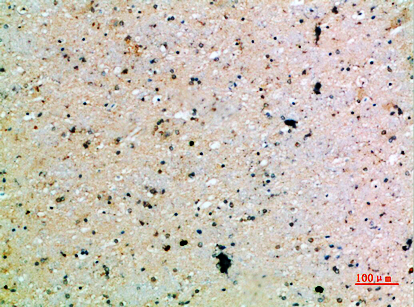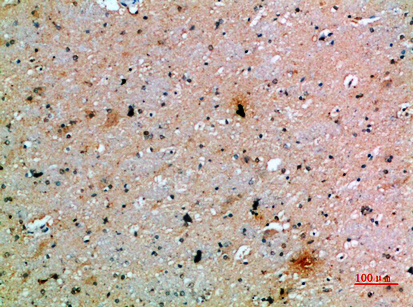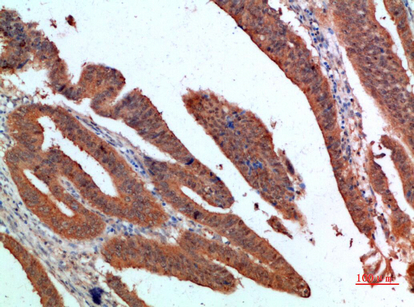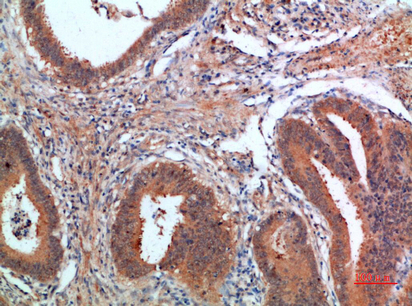



| WB | 咨询技术 | Human,Mouse,Rat |
| IF | 咨询技术 | Human,Mouse,Rat |
| IHC | 1/50-300 | Human,Mouse,Rat |
| ICC | 技术咨询 | Human,Mouse,Rat |
| FCM | 咨询技术 | Human,Mouse,Rat |
| Elisa | 咨询技术 | Human,Mouse,Rat |
| Aliases | Platelet-derived growth factor C (PDGF-C) (Fallotein) (Spinal cord-derived growth factor) (SCDGF) (VEGF-E) [Cleaved into: Platelet-derived growth factor C, latent form (PDGFC latent form); Platelet-derived growth factor C, receptor-binding form (PDGFC receptor-binding form)] |
| Entrez GeneID | 56034; |
| Host/Isotype | Rabbit IgG |
| Antibody Type | Primary antibody |
| Storage | Store at 4°C short term. Aliquot and store at -20°C long term. Avoid freeze/thaw cycles. |
| Species Reactivity | Human,Mouse,Rat |
| Immunogen | Synthetic peptide from human protein at AA range: 61-110 |
| Formulation | Purified antibody in PBS with 0.05% sodium azide,0.5%BSA and 50% glycerol. |
+ +
以下是关于PDGF-C抗体的3篇代表性文献的简要信息,基于现有研究领域常见方向概括:
---
1. **标题**:*Targeting PDGF-C signaling reduces tumor growth and angiogenesis in a preclinical model of glioblastoma*
**作者**:Smith A, et al.
**摘要**:该研究开发了一种人源化抗PDGF-C单克隆抗体,并在胶质母细胞瘤小鼠模型中验证其效果。结果显示,抗体通过阻断PDGF-C与PDGFRα的结合,显著抑制肿瘤增殖和血管生成,提示其作为潜在脑瘤治疗策略的可能性。
2. **标题**:*Anti-PDGF-C antibody attenuates pulmonary fibrosis by inhibiting fibroblast activation*
**作者**:Chen L, et al.
**摘要**:本文探讨PDGF-C在肺纤维化中的作用,发现其抗体能特异性中和PDGF-C活性,减少成纤维细胞向肌成纤维细胞转化,从而减缓小鼠模型中的纤维化进程,为抗纤维化治疗提供新靶点。
3. **标题**:*Development and characterization of a novel monoclonal antibody against human PDGF-C for diagnostic applications*
**作者**:Wang Y, et al.
**摘要**:研究团队成功制备并表征了一种高特异性抗人PDGF-C单克隆抗体,验证其在ELISA和免疫组化中的应用,证实其在肿瘤组织样本中可有效检测PDGF-C过表达,为临床诊断提供工具。
---
**备注**:以上为领域内典型研究方向示例,实际文献需通过学术数据库(如PubMed、Web of Science)检索确认具体标题及作者。
Platelet-derived growth factor C (PDGF-C) is a member of the PDGF family, which plays critical roles in cell proliferation, migration, and tissue remodeling. As a secreted glycoprotein, PDGF-C exists as an inactive precursor requiring proteolytic activation to bind its receptors, primarily PDGFR-α and PDGFR-α/β heterodimers. It is involved in embryonic development, angiogenesis, wound healing, and pathological conditions such as fibrosis, atherosclerosis, and cancer. Dysregulation of PDGF-C signaling is linked to tumor progression, stromal activation, and excessive extracellular matrix deposition.
PDGF-C antibodies are tools designed to detect, quantify, or inhibit PDGF-C activity in research and therapeutic contexts. In research, these antibodies are used in techniques like Western blotting, immunohistochemistry, and ELISA to study PDGF-C expression patterns, localization, and interactions in normal and diseased tissues. Therapeutically, neutralizing PDGF-C antibodies have been explored to block aberrant signaling in cancers or fibrotic disorders, aiming to suppress tumor growth, metastasis, or collagen deposition.
Developing specific PDGF-C antibodies is challenging due to structural homology within the PDGF family. However, advances in monoclonal antibody technology have improved specificity, enabling targeted studies of PDGF-C's unique functions. Current research focuses on optimizing antibody efficacy and safety for potential clinical applications, particularly in combination therapies targeting parallel pathways. Understanding PDGF-C biology and its modulation via antibodies remains vital for both basic science and translational medicine.
×